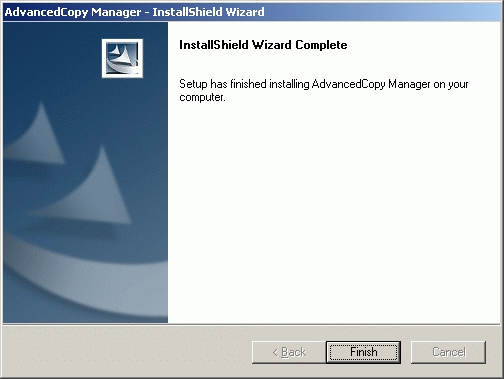This section explains the installation method of the Agent of AdvancedCopy Manager.
Kind of installation
The following two methods of installation are available:
Custom install
Default install
Custom install and default install are described below.
Custom install
With the custom install method, the user enters the various types of install information (install destination, startup account name, port numbers used for each service, and so on) in the windows.
Default install
The default install method uses the default install information. The input tasks that use windows can be omitted.
Default install information
[Install destination]
Program directory
<System drive>:\Win32app\AdvancedCopyManager\ |
Environment setup directory
< System drive>:\Win32app\AdvancedCopyManager\ |
Work directory
< System drive>:\Win32app\AdvancedCopyManager\ |
[Startup account name]
Account name: acmuser Password: acmuser
Note: In Windows Server 2008 or Windows Server 2008 R2, the password is 'acm!123'
[Port numbers used for each service]
Communication service: 1226
Error checks
The following error checks are automatically performed for the default install information.
If the error checks detect an error, a warning dialog is displayed and the display returns to the [Welcome] window (install options selection window).
[Install destination]
Checks that the free disk space required for installation is available
[Account name/Password]
If the default account name already exists in the system, checks that the password matches the default password
Note: If the default account name does not exist in the system, a new user is created with the default account name and password.
[Port numbers]
Checks that the default port numbers are not being used for something else
Note: If an alias has been used to define an AdvancedCopy Manager service name, a warning dialog is displayed and a port number is not registered. The install process can be continued by clicking the [OK] button.
Note
To operate a storage server in a cluster system:
Refer to "Installation of The agent function of AdvancedCopy Manager" in the "ETERNUS SF AdvancedCopy Manager Operator's Guide for cluster environment".
Combination of a database and the Agent of AdvancedCopy Manager
The Agents of AdvancedCopy Manager that can be installed are as follows.
AdvancedCopy Manager (32bit) for Windows Server 2008(x86,x64)
AdvancedCopy Manager (64bit) for Windows Server 2008(x64)
AdvancedCopy Manager (64bit) for Windows Server 2008 for Itanium-Based Systems
Depending on the database, there is a difference between which Agent of AdvancedCopy Manager should be installed, as shown below.
The server backup or restore Exchange Server database
AdvancedCopy Manager (64bit) for Windows Server 2008(x64)
The Agents of AdvancedCopy Manager that can be installed are as follows.
AdvancedCopy Manager (32bit) for Windows Server 2008 (x86,x64)
AdvancedCopy Manager (64bit) for Windows Server 2008 (x64)
Depending on the database, there is a difference between which Agent of AdvancedCopy Manager should be installed.
The server backup or restore Exchange Server database
AdvancedCopy Manager (64bit) for Windows Server 2008(x64)
When installing the AdvancedCopy Manager for the first time, select "startup account" as the user type. This user type can activate each service of AdvancedCopy Manager. To specify the "startup account", the user must satisfy the following conditions:
The user must belong to the Administrator's group of the local computer.
A password with no expiry date has been set.
However, if the user of the specified "startup account" does not belong to the Administrator's group, the system will automatically perform this task.
Also, since the "startup account" is used as the account for activating the services of AdvancedCopy Manager, the following authority will be added during installation:
Log on as a service
Act as part of the operating system
Increase quotas
Replace a process level token
Note
The structure of the account name and password must satisfy all requirements of the file system naming convention supported by the Windows OS.
Install the Agent of AdvancedCopy Manager, using the following procedure:
Logon as the user who has the Administrator's authority
Insert the AdvancedCopy Manager CD-ROM (Agent Program) into the CD drive and the initial window will be displayed.
Click [Install Function for Storage Server].
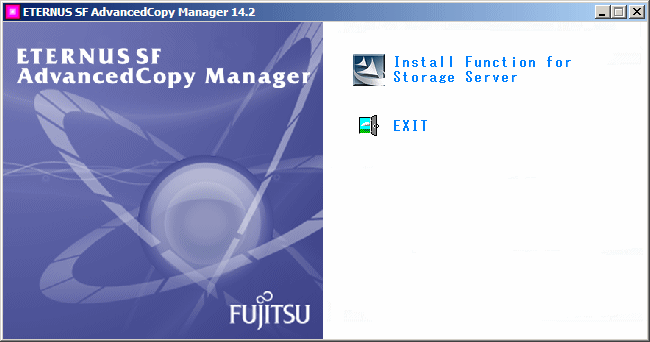
Choose whether to use the Exchange server online backup feature in the following window.
(This window is displayed in case of Windows Server 2008 x64 or Windows Server 2008 R2)
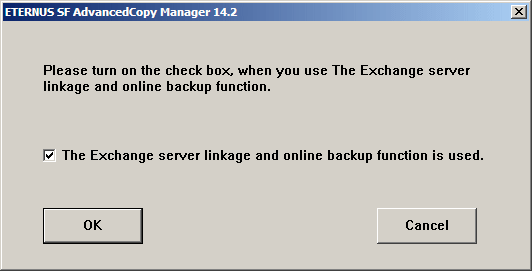
If the check box is checked
AdvancedCopy Manager (64bit) for Windows Server 2008 (x64) is installed.
If the check box is not checked
AdvancedCopy Manager (32bit) for Windows Server 2008 (x86,x64) is installed.
The next window is displayed. Check the displayed contents, then click the [Next] button.
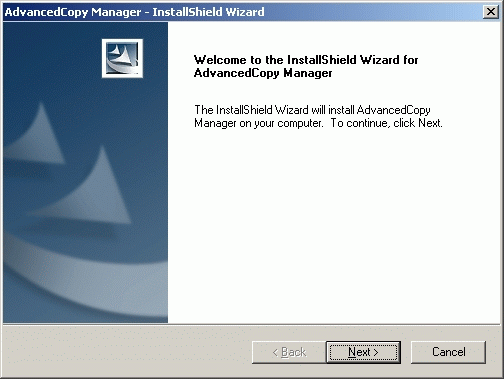
Accept the license terms and conditions displayed on the [License Agreement] window.
Check the displayed contents, and then click the [Yes] button.
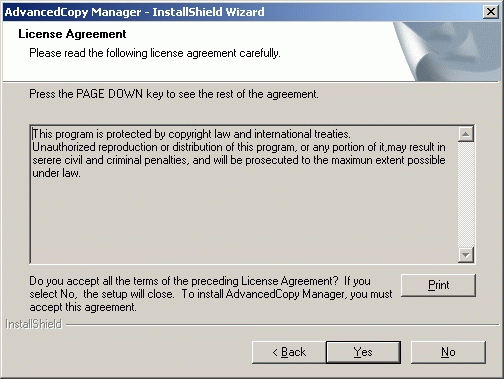
On the [Welcome] window, select the install option (default or custom).
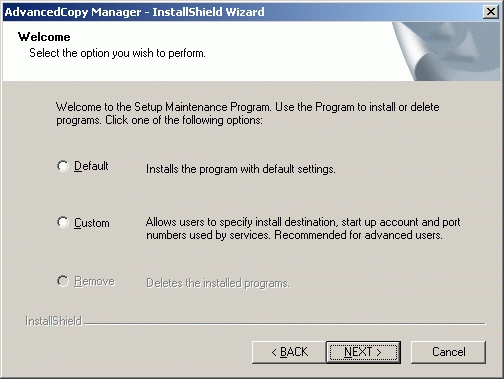
If [Default] is selected
The install information settings on the following windows can be omitted (the settings in steps 6 to 8 are not required):
[Specify installation directory] window
[Register a Startup Account] window
[The registration of the port] window
Error checks are performed automatically for the default install information of the omitted windows.
If an error is detected:
A warning dialog is displayed and the display switches back to the main window.
If no errors are detected:
The [Start Copying Files] window is displayed.
Refer to "Chapter 3 Customization of Storage Management Server" for the default install information and the error check contents.
If [Custom] is selected
Install information settings must be entered in each of the install windows.
Enter the required information as indicated for the display windows in step 7 and subsequent steps.
Specify the installation directory.
If this product is to be installed in directories other than those displayed (default directories), click the [Browse] button to select the desired directories. After all the proper directories have been selected, click the [Next] button. Note: directories with spaces in their names (e.g., Program Files) must not be specified.
If the [Browse] button is clicked, the following screen is displayed.
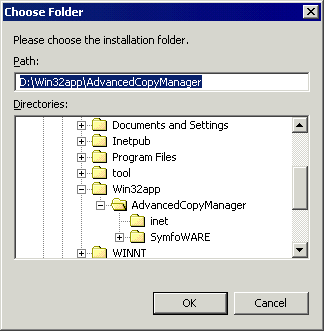
Specify the startup account in the [Register a Startup Account] window.
Input the account's name belonging to the Administrator's group with a password, and click the [Next] button. The account name and password must satisfy must satisfy all requirements of the file system naming convention supported by the Windows OS.
For details of the startup account, see "2.1.3 Startup account".
If a previously unregistered name is entered, it should be registered as a new account. At this time, the system automatically sets the password to unexpired and assigns it to the Administrator's group. In addition, the system automatically sets the following user's authority:
Log on as a service
Act as part of the operating system
Increase quotas
Replace a process level token
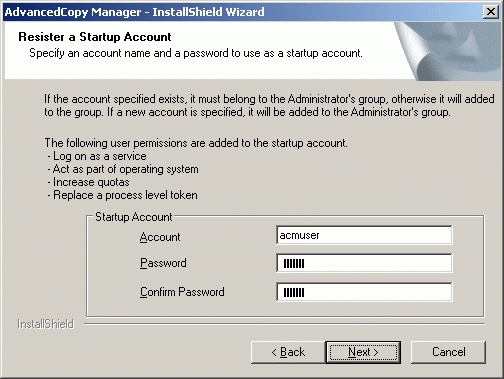
See
For the password changing of the startup account, refer to "Changing the startup account" in the "ETERNUS SF AdvancedCopy Manager Operator's Guide (Windows)".
Specify the port number to be allocated for the service in the [Port Registration] window.
If changing the port number from the recommended value, enter a number in the following range:
5001 to 32767
The first displayed value is the recommended value for a non cluster environment, and does not necessarily need to be a unique number.For cluster operations in Windows Server 2003, change all port numbers to numbers in the above range.
After the port number entry is complete, click the [Next] button. If a specified port number is already assigned for something else, this window will be redisplayed.
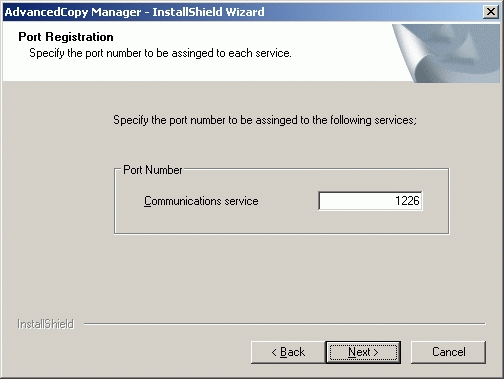
If the AdvancedCopy Manager service name is defined with an ALIAS, the following window will be displayed and the port number specified on the previous window is ignored.
The installation however will proceed.

The file below should be edited if the port number is set manually.
C:\WINDOWS\system32\drivers\etc\Services |
Confirm the settings on the [Start Copying Files] window. If the information entered is correct and no mistakes have been detected, click the [Next] button. To correct or modify any settings click the [Back] button.
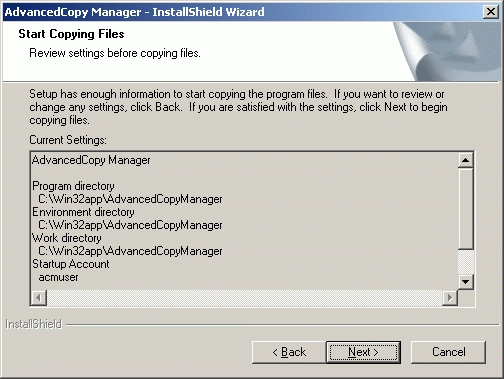
The copy process will begin, and its progress will be displayed on the [Setup Status] window.
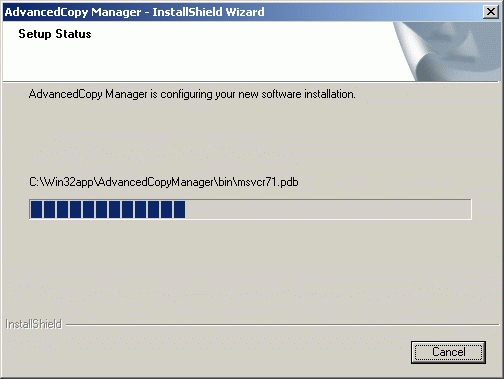
To complete the installation, click the [Finish] button.
